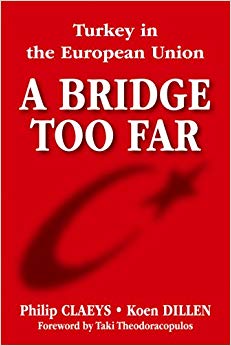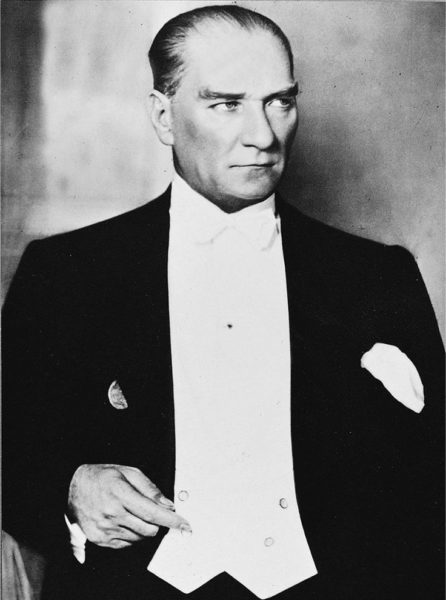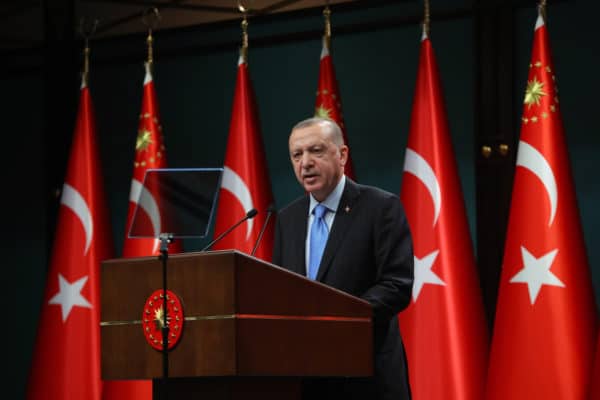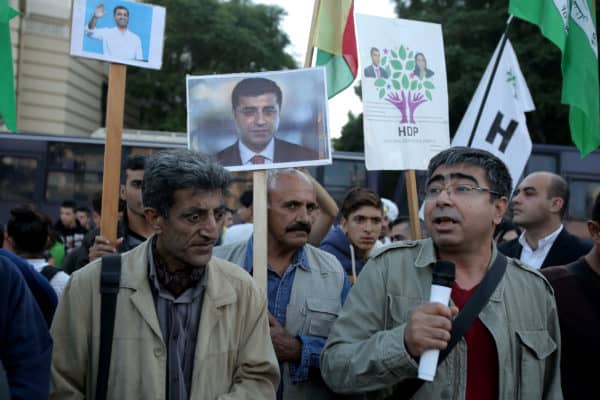Why Turkey Must Not Join the European Union
- Post AuthorBy Thomas Jackson
- Post DateSun May 23 2021
Philip Claeys and Koen Dillen, A Bridge Too Far: Turkey in the European Union, Egmont Publishing, 2008, 222 pp.
Ia sane world, certain books would not have to be written, and A Bridge Too Far is one of them. A joint effort by two Vlaams Belang members of the European Parliament, it patiently explains why it would be folly to admit Turkey as a member of the European Union. In a merely semi-sane world no one would have to explain why that is a bad idea, and in a genuinely sane world no one would even think of it. And yet, on October 6, 2004, the European Commission announced the beginning of official negotiations on admission, and many Europeans believe the process has now gone too far to be turned back. This book leaves no doubt that the process must be turned back.
As the authors point out, the most obvious reason Turkey should not join the EU is that it is not a European country. Only 4 percent of its territory, the area around the former Constantinople, is on the European side of the Dardanelles. That area became Turkish only because the Turks conquered it in 1453 and expelled, murdered, or forcibly converted the Greeks who lived there.
The authors also explain that the treaties that govern the European Union are explicit: only European nations may join. Morocco’s application was turned down for that reason. If Turkey were admitted, “Europe” would border on Iran, Iraq, and Syria, and there would be no reason not to admit Nigeria or Pakistan. The former prime minister of Belgium, Guy Verhofstadt, once tried to argue that Turkey is a European nation because it ruled the Balkans for 300 years. Never mind that it was an oppressive rule; by that standard France and Britain could be considered American and African countries.
Even if Turkey were fully within the geographical bounds of Europe, it could not be considered European because 99.8 percent of the population is Muslim. Although the modern nation of Turkey was founded by Kemal Ataturk in 1923 as a secular state, secularism has never taken root. Turkey is a member of the Organization of the Islamic Conference, which was founded “to promote solidarity among all Islamic member states,” and the current secretary general of the conference is a Turk. In 2004 the organization repudiated the European Union’s condemnation of stoning as a punishment. In Turkey itself, religious minorities are not legal entities so cannot even own property. Fanatics occasionally hunt down and kill Christians, and the authorities are slow to pursue them.
Kemal Ataturk
During the 2006 controversy about the Danish Mohammed cartoons, the Turkish envoy to Denmark was one of a group of Islamic ambassadors who insisted that the Danish prime minister condemn the cartoons. Demonstrations in Turkish cities against the cartoons attracted tens of thousands of people, and Turkish Prime Minister Recep Erdogan said, “We cannot tolerate such an immoral assault on our prophet.” That same year he also told the Council of Europe in Strasbourg that incitement of hatred of Islam should be a crime in Europe.
Mr. Erdogan, who is still prime minister, has been tireless in his efforts to bring Islam back into public life. The veil had essentially disappeared in Turkey, but in his first public appearance after he was elected in 2002, he appeared with his wife and daughters — all of whom wore veils. His wife once refused, on religious grounds, to shake hands with the Italian prime minister. Mr. Erdogan himself has said that if a Turk is forced, by circumstances, to shake hands with a Western woman he must immediately ask Allah for forgiveness.
Since the 1920s, it has been against the law for women to wear headscarves in public buildings or universities, but Mr. Erdogan has led a mass movement to change the law. This is an immensely symbolic issue in Turkey, and he has not yet managed to get his way, so he sent his daughters to college in the United States, where they could attend classes with their heads covered. He has also tried to ban the public sale of alcohol and to separate men and women in public transportation.
Turkish President Recep Tayyip Erdogan. (Credit Image: © Xinhua via ZUMA Press)
Islam is clearly making a comeback in Turkey. Thirty-nine percent of married Turkish women say it is proper for men to beat their wives. The law forbids anyone under the age of 18 to have sexual intercourse, and although prosecutions are rare, the authorities have the right to conduct “virginity tests” on women to determine guilt. There are about 100 “honor killings” every year, in which men murder a family member because she has strayed from Islamic standards of purity. The authors of this book conclude that it is not possible to rule out an Iranian-style reestablishment of an Islamic state.
The European Union requires that its member nations be democracies, but Turkey’s politics are essentially Third World. It is still common to jail political opponents and to shut down newspapers that criticize the regime. There are laws against “denigrating Turkishness,” “insulting the president,” or “insulting Ataturk’s memory,” which are very useful tools for stifling dissent. It is taboo to write about the Kurdish independence movement or to criticize the official view that Turkey never committed genocide against Armenians, and the authorities frequently try to block Internet sites. There are hundreds of cases of political torture every year, and police routinely torture common criminals to get confessions. Even though the US promotes EU membership for Turkey, every year it issues a stinging report on Turkish human rights violations.
During the 1980s and 1990s, the Turkish government waged war against the PKK, the Kurdish independence movement. The army destroyed hundreds of Kurdish villages, and there are still an estimated one to three million displaced Kurds. Kurdish activists can be arrested for speaking Kurdish or for distributing materials in Kurdish. Over the years, successive Turkish governments have essentially hounded all Greeks out of the country.
Kurds participate in a protest rally close to the Turkish embassy in Athens on Saturday November 5, 2016 (Credit Image: © Panayiotis Tzamaros / NurPhoto via ZUMA Press)
Entirely aside from these deep cultural incompatibilities, it would be impossible to integrate Turkey into the EU. Its per capita GNP is only one fifth that of Europe, and 27 percent of the population still works in agriculture. Turkey’s primitive, small-sale farmers could not possibly fit into the EU’s Common Agricultural Policy. There are EU structural funds that are supposed to help depressed parts of the union, but all of Turkey qualifies for help. The EU would either have to change its system or face crushing transfer payments.
Bureaucrats interfere at all levels of the Turkish economy, which is dominated by crony capitalism and abuse of power. As much as 40 percent of GNP may be outside the formal economy and therefore untaxed. Foreigners hesitate to invest because the commercial code is enforced haphazardly. Ten percent of grade-school-aged children are not in school, and Turkish students perform badly on international standardized tests.
If Turkey joined the EU it would soon have the largest population of any member state and thus the most representation in European institutions. Its citizens would demand proportional representation in all the European bureaucracies, and Turkey could logically demand that Turkish be made one of the official languages of Europe. Overnight, the Muslim population of the union would go from 5 to 15 percent.
The authors of this book note with alarm that Turkish membership would mean Turks could legally live anywhere in the European Union. Turkey has high unemployment and minimal social security programs, so Turks would swarm into Europe. Many would do so for nationalistic as well as economic reasons. As the Turkish-German Euro-MP Vural Öger has said, “What Suleyman started with the siege of Vienna in 1683 we will finish with out inhabitants, with our powerful men and women.” The already disaffected Turkish population of Germany would become even more isolated and chauvinistic, and similar enclaves would spring up in other countries. In 2008, when Prime Minister Erdogan visited Germany, he addressed a rally of 20,000 Turks from all over Europe. He was met with wild applause when he exhorted them to remain Turks through and through, saying that assimilation would be a “crime against humanity.”
Vural Öger (Credit Image: © Imago via ZUMA Press)
Although one could argue that what the Turks say about their own history is their business, Europe has made it a semi-official requirement of membership that Turkey recognize and atone for the Armenian massacres of 1915 to 1917. A Bridge Too Far gives a good, brief account of how the Turkish government deported some 1.5 to 2.1 million Armenians to the East, where most died. The Armenians were objects of scorn because they were Christians, and the Turks accused them of collaborating with the Russians during the First World War. The Turks say they were merely relocating a hostile population during wartime, but they killed people hundreds of miles from the front and confiscated their belongings. The Turkish education system trivializes what was done to the Armenians, and the government has built a monument to Mehmet Talaat, the interior minister who organized the massacres.
In 2001, when the French parliament officially recognized that what was done to the Armenians was genocide, the Turks reacted with fury, withdrawing their ambassador from Paris and canceling trade agreements. There were demonstrations outside the French embassy and consulates, and a major newspaper published French president Jacques Chirac’s personal e-mail address and urged readers to flood it with hate-mail.
If Europe were serious about its own rules, there is another reason categorically to reject Turkish membership: Turkey does not trade with or even recognize a current member state and has a part of that country under military occupation. That country is Cyprus. This book explains the background of the 1974 invasion of Cyprus, in which the Turks occupied the northern part of the island and proclaimed the independent government of North Cyprus. Only Turkey recognizes North Cyprus.
Who favors Turkish membership in the EU? Not surprisingly, the United States is a big fan, and not merely for the usual multi-culti reasons. The US government first expressed support for membership in 2002 when it wanted Turkish permission to invade Iraq from the north. Promoting membership did no good; the Turks were loyal to the faith and would not let infidels invade a fellow Muslim nation. Americans have gotten nothing in return for pandering. The percentage of Turks who call themselves favorable to the US has fallen from 52 percent in 2000 to 12 percent in 2006.
Within Europe, the most vocal proponents of Turkish membership are leftist political parties. The struggle for race/immigrant rights long ago replaced the class struggle, and European Turks who have the vote support the Left as consistently as blacks and Hispanics support it in the United States. Also, as they do everywhere, employers want cheap labor, and the media parade their ideological virtue by supporting membership.
The Turks themselves are demanding membership in an increasingly arrogant way. The head of the Turkish community in Germany, for example, has said that refusal would be “a kind of declaration of war against Turkey and the Turks living in Germany.” Turks have discovered that their most effective weapon is to accuse Europe of “racism,” and soft-headed European lefties have joyfully taken up the refrain. British Labour Euro-MPs have said it would be “institutional racism” if Turkey were not let in. Jacques Attali, a prominent advisor to socialist French president Francois Mitterand, unwittingly revealed the foolishness of his country’s past immigration policies when he explained why Turkey must be made a member: “If France and Europe decide to confirm themselves as a Christian club, they had best prepare themselves for a confrontation with a billion [Islamic] people, a real war of civilizations. But on top of this, France would also be confronted with a genuine civil war. Because of its earlier geopolitical choices, France is an Islamic nation: Islam is the religion of more than two million French citizens and of a third of the immigrants on its territory.”
Jacques Attali (Credit Image: © Imago via ZUMA Press)
The authors of this book point out that what was then the European Economic Community concluded a treaty “of association” with Turkey in 1963, which removed trade barriers and raised the possibility of eventual membership. At that time, Europe was not nearly as integrated as it is now, and membership would not have meant an onslaught of handout-hungry immigrants. Another former French president, Jacques Chirac, suspects that in those early days, Euro-bureaucrats assumed there was no real chance of membership, and jollied the Turks along with the expectation that a firm “no” could always come later. Now, the process of “accession,” as it is called, has progressed to the point where rejection will have to be very pointed. As A Bridge Too Far notes, formal accession negotiations have never failed to result in membership, and a firm rejection years ago would have been much easier than one now.
Not surprisingly, the staunchest opponents of Turkish membership are ordinary Europeans. There is not one EU country in which the majority of the people favor membership, and the numbers opposing it continue to grow. So far, decisions on Turkey have been taken by a handful of bureaucrats who, in the grand socialist tradition, claim to know better than the people.
One of the consistent demands of European nationalist parties is that Turkish membership be put to referendum. The pro-membership forces are terrified of this because they know they will lose, and that a single national “no” vote would blackball the Turks. The authors of this book warn, however, that it is entirely possible that not one of the current 27 member states will let its citizens speak, and that Turks will be crammed down their throats by a cabal of politicians. It would be hard to think of a more craven and contemptible betrayal, and no book better explains what is at stake than A Bridge Too Far.
- Post TagsBook Review, Classics, Europe, Islam, Islam in Europe/Asia, Racial Conflict, Turkey





